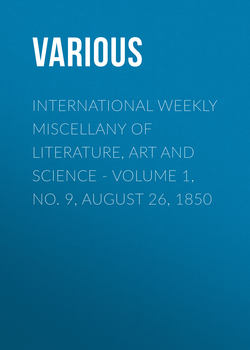International Weekly Miscellany of Literature, Art and Science - Volume 1, No. 9, August 26, 1850

Реклама. ООО «ЛитРес», ИНН: 7719571260.
Отрывок из книги
Of the chivalry, the gallantry, the splendor, the hospitality, the courage, and the love of liberty of the Hungarian noble or gentleman, no one doubts. Of his ideas of true constitutional freedom, or the zeal with which that or Hungarian independence has been maintained first through Turkish, and then German domination for some hundred years past, doubts may be entertained. Neither do the Hungarian peasantry or people reflect high credit on their "natural superiors." Something should be deducted for the forced vivacity and straining after effect of the littérateur; but this sketch of a large class of peasantry from Max Schlesinger's "War in Hungary," just published in London, must have some foundation in truth—and very like the Red Indians or half-breeds of Spanish America the people look.
"The Csikos is a man who from his birth, somehow or other, finds himself seated upon a foal. Instinctively the boy remains fixed upon the animal's back, and grows up in his seat as other children do in the cradle.
.....
M. Max Schlesinger, author of "The War in Hungary, in 1848-9,"—a work which, from what we read of it in the foreign journals, is much the most striking and attractive of all that have appeared upon its subject in English,—is described in the Athenæum, as by birth a Hungarian, by the accidents of fortune a German. For some time a resident in Prague, and more recently settled in Berlin, he has had excellent opportunities of seeing the men and studying the questions connected both in the literary and political sense with the present movement of ideas and races in Eastern Europe. His acquaintance with the aspects of nature in his native land—his knowledge of the peculiar character of its inhabitants, their manners, modes of thought and habits of life—his familiarity with past history—his right conception of the leading men in the recent struggle—are all vouched for as "essentially accurate" by no less an authority than Count Pulszky. It would be an injustice merely to say that M. Schlesinger has given in an original and picturesque way a general view of the course of events in the late war, more complete and connected than is afforded in any account hitherto presented to the public. He has done more: he has enabled the German and English reader to understand the miracle of a nation of four or five millions of men rising up at the command of a great statesman, and doing successful battle with the elaborately organized power of a first-class European state, shaking it to its very foundations, and contending, not without hope, against two mighty military empires,—until the treachery from within paralyzed its power of resistance.
Dr. Mayo's new novel, "The Berber, or the Mountaineer of the Atlas," published by Putnam, promises to be scarcely less popular than his "Kaloolah." The Evening Post says of it: "Kaloolah was a sprightly narrative of the wanderings of a Yankee, who seemed to combine in his person the characteristics of Robinson Crusoe with those of Baron Munchausen; but the Berber professes to be nothing more than a novel; or, as the author says in his preface, his principal object has been to tell an agreeable story in an agreeable way. In doing so, however, an eye has been had to the illustration of Moorish manners, customs, history, and geography; to the exemplification of Moorish life as it actually is in Barbary in the present day, and not as it usually appears in the vague and poetic glamour of the common Moorish romance. It has also been an object to introduce to the acquaintance of the reader a people who have played a most important part in the world's history, but of whom very few educated people know anything more than the name. As Dr. Mayo has traveled extensively over the regions he describes, we presume that his descriptions may be taken as true. His account of the Berbers, a tribe of ancient Asiatic origin, who inhabit a range of the Atlas, and who live a semi-savage life like the Arabs, is minute, and to the intelligent reader quite as interesting as the more narrative parts of the work. It is, perhaps, the best evidence of the merits of the book, that the whole first edition was exhausted by orders from the country before the first number had appeared in the city."
.....